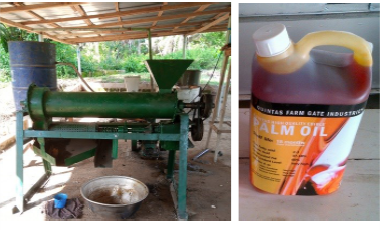Quintas Renewable Energy Solutions is an indigenous renewable energy company focusing on Off Grid Electricity generation and productive use of Energy. The systems are all locally fabricated machines that combust any solid, dry biomass into combustible gases for efficient extraction of heat energy, and electricity for crop dryers.
Agro-processing Value Chain & Electricity Generation

Agricultural processes in many parts of Nigeria involve the use of traditional and manual machines that use up a lot of firewood, fossil fuels such as diesel-powered machines and resulting in economic and environmental waste and pollution. The outcome of these agricultural processes is mostly poor quality, unhygienic, expensive, and do not take advantage of the possibility of operating a circular economic model. Boiling, drying, and milling are essential parts of most agricultural processing value chains. Unfortunately, this is largely done using lots of firewood, open drying, landfill disposal of waste, and patronizing expensive and dirty diesel milling and grinding machines for crops like cassava processing, palm oil processing, etc.
Quintas Renewable Energy Solutions is an indigenous renewable energy company focusing on Off Grid Electricity generation and productive use of Energy. They manufacture biomass energy generation equipment and simple agro-processing machines. Qunitas Biomass Burners and Dryers machines, and farm value chain processing centers. The systems are all locally fabricated machines that combust any solid, dry biomass (such as crop waste i.e. kernel shells, corn hobs, rice husks, shrubs, palm oil shafts, etc.) into combustible gases for efficient extraction of heat energy, and electricity for crop dryers (i.e drying cassava, yam peels, plantain, etc), agro-industrial processing such as par-boiling and steaming of produce.
The target markets are farm gate processing centers i.e. cassava or palm oil processing units in villages, as well as unelectrified off-grid communities.
Qunitas Energy operates various business models to either suit their clients, meet community needs and design, or proof of a concept. These models range from an owner operation model, where Quintas established and operates a farm processing centre using biomass and charges a fee (pay-as-you-use) from customers that want to process their palm oil or cassava (in this model, payments are either in cash or commodity). They also operate a cooperative model, where groups of farmers or processors charge Quinta Energy with the task of setting up or retrofitting their processing units, training their members of management to maintain the equipment and improving the value chain in packaging and trading. The latter sometimes is also done in collaboration with Quintas, and not only the setup service provided. Lastly, Quintas also work with rural communities, offering them a range of services related to waste collation, usage, machine handling, and after-delivery support.
- The Climatology Department of the World Bank named Quintas as one of the ten inventors in the world, whose works could cause a significant reduction in global carbon emissions - 2009
- Quintas won the World Economic Forum “Technology Pioneers Award” for 2011
- They are the Award winner of the BoI/UNDP Access to Renewable Energy Challenge in Nigeria in 2012.
- They are also an Award winner of the United States of America, Africa Development Foundation (USADF) 2014 Power Africa Energy Challenge Competition
- They are also an award winner of the 2014 West Africa Power Industry Award as the Best Renewable Energy Project in West Africa
- Quintas Energy is also a top runner-up at the 2016 Siemens/Stiftung 2016 Empowering Peoples Award
- They have two certified patent awards for two of their technological solutions from the Federal Government of Nigeria Patent in 2018
The cost of establishing a biomass processing plan, or integrating the technology into existing processes depends on the size of the proposed project and the economics and preference of the client. Because each biomass machine is flexible and can be designed to fit the community or client, the cost range is between NGN 300,000 to N8,000,000.
Quinta's proof of concept and experiences are evidenced in the awards and recognition from various international bodies already listed above.
With waste now part of Nigeria's improved National Determined Contribution 2023, solutions like Quintas Energy biomass waste to energy is a great solution to promote as a strategic driver to cut back the emission of carbon and other toxic chemical i.e. methane. The National Environmental Standard Regulation Act 2007 is a good backing for this solution as it proffers a solution to environmental waste management from the agricultural sector on solid waste management.
Quintas is set to train over 100 young people in collaboration with NASENI in Biomass – waste to power machine production.
With the proof of concept of producing dried, processed and packaged agricultural products using waste energy now established, Quintas Energy plans to replicate the farm gate process cluster to over 300 farm processing communities and space with the right support.
With the local and state governments, like Lagos state seeking sustainable ways to address their waste problems, Biomass waste to energy for electrification and agro-processing is a viable strategic solution.
The opportunities are enormous with the increasing waste and urbanization in Nigeria. Government, private sector and communities do not use their waste and end up burning it in open spaces, polluting the environment and wasting potential energy. Large-scale conversion of Nigeria increasing waste to generate electricity in Nigeria. There are over 1000 biomass plans in Germany and over 500 in China, with expansion in agricultural production, and the waste that will emit from there, we need over 5000 Quintas energy to clear the waste.

